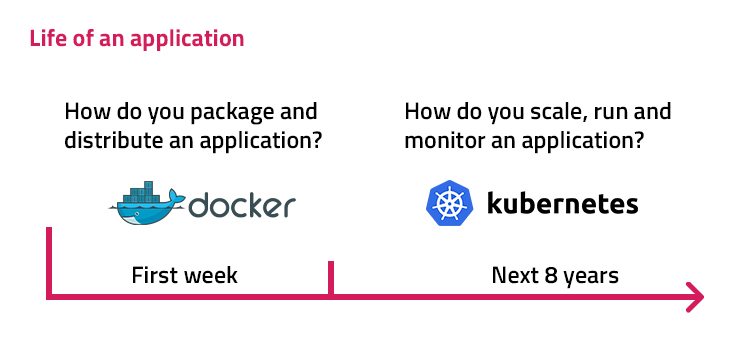Docker and Kubernetes are two of the most loved platforms used by developers today. They have maintained their presence in the top lists of most loved platforms of the world consistently. Containers that began as Linux kernel process isolation construct have today become one of the smoothest and fastest ways to develop applications.
What are containers?
Containers are packages that help software run reliably when moved from one computing environment to another, for instance, from a developer’s laptop to a test environment or from a staging environment into production, or maybe from a physical data center to a virtual machine in a public or private cloud. Containers comprise entire runtime environments – the applications, its dependencies its libraries, other binaries, its required configuration files, everything bundled together into one small package. When containers are used to develop applications, differences in OS distribution and underlying infrastructure are abstracted away.
Simply put, containers are small units of software that contain the code and all its dependencies so the application can run smoothly, quickly, and reliably from one computing environment to another. Containers give you instant application portability.
With a perfectly tuned container system, you can have four to six times the number of server application instances as you can using Xen or KVM VMs on the same hardware. They are more efficient than hypervisors. They also lend themselves to the CI/CD pipelines. CI/CD pipeline is a popular DevOps methodology that is designed to encourage developers to integrate the code they write into a shared repository as quickly and as often as possible, and then to deploy that code quickly and more efficiently.
A Puppet survey reveals that by using CI/CD and containers, IT departments with strong DevOps workflows were able to deploy software 200 times more frequently than low-performing IT departments. They also recovered about 24 times faster and had three times lower rates of change failure. Incidentally, it also found that these businesses were spending about 50% less time overall in addressing security issues and had 22% lesser time spent on unplanned work.
With the increasing adoption of Docker and Kubernetes, there is a subsequent increase in demand for professionals who are skilled in working with Docker and Kubernetes. A good Kubernetes Online training can help you on your way to building a successful career in building containerized applications using Docker and Kubernetes. Getting certified in Kubernetes would ideally be the first step towards a successful career in using containers and microservices. But before you get there, it would be good to understand what is Docker and Kubernetes, after all.
What is Docker?
Docker is an open-source platform for developing, shipping, and running applications. It is the tool that will help you separate your applications from your infrastructure so that you can deliver the software quickly. Using Docker, you could manage your infrastructure just how you manage your applications.
Developing an application is a process that goes way beyond just writing code. It involves the usage of multiple languages, frameworks, architectures, and even discontinuous interfaces between different tools throughout the various stages of the development lifecycle. All this makes the process incredibly complex.
Docker helps simplify all this complexity and enables the acceleration of the workflow. It also gives the developers the freedom to innovate using their chosen tools or application stacks or deployment environments. Isn’t that a great win-win situation for everyone?
The best thing about Docker – it is a tool built for the developers, by the developers. Nobody understands the challenges faced by developers better than developers themselves. And Docker is a developer’s tool through and through, intending to facilitate collaboration, inclusion, and advancement. It is also beneficial for system administrators and operations staff. Moreover,
Docker is an open-source tool, so anyone can contribute to the platform as well as extend it to meet their own needs if they need certain additional features that are not available in the out-of-the-box version.
What can Docker do?
Here are some of the functions Docker can serve:
- Fast, consistent delivery of applications
- Streamline the development lifecycle
- Allow developers to work in standardized environments using local containers
- Build and accelerate CI/CD workflows
- Achieve responsive deployment and scaling
- Enable highly portable workloads
- Enable dynamic management of workloads
- Help scale up or tear down applications depending on business needs
- Serve as a cost-effective alternative to hypervisor-based virtual machines
- Operate effectively in high-density environments

What is Kubernetes?
Kubernetes is a portable, extensible, open-source platform for managing containerized workloads and services aimed at facilitating both declarative configuration and automation. If you are using containers to bundle and run your applications then Kubernetes is an essential tool for you. In a production environment, you would need to manage the containers that run the applications while ensuring that there is no downtime. So, if a container suffers an incident, another needs to start running and keep the system going. Kubernetes provides the platform and the framework to run these distributed systems resiliently. Kubernetes can effectively manage scaling and failover for applications, and provide deployment patterns for use.
Simply put, Kubernetes is an open-source container orchestration platform that helps automate the various manual processes such as deploying, managing, and scaling for containerized applications.
One of the major advantages of using Kubernetes, especially when optimizing application development for the cloud is that it gives you a platform to schedule and run containers on clusters of physical or virtual machines. With Kubernetes, you can implement and safely rely on container-based infrastructure while working in production environments. The key aim of Kubernetes is the automation of operational tasks and it is one of the most popular platforms for this. It is an excellent platform for creating cloud-native apps, thanks to the availability of Kubernetes patterns.
What can Kubernetes do?
Here are some of the functions offered by Kubernetes:
- Service discovery
- Distribution of network traffic and load balancing
- Automatically mount the chosen storage system & storage orchestration
- Automate the processes for rollouts and rollbacks
- Optimize resource utilization with automatic bin packing
- Restart, replace, and kill containers owing to its self-healing nature
- Secret and configuration management
- Orchestrate containers across multiple hosts
- Scale containerized applications and their resources on the go
- Control and automate application deployments
Together, Docker and Kubernetes are the most popular and most effective tools used by the development and operations teams when building and deploying applications. Both these tools are comprehensive de facto solutions for intelligently managing containerized applications. Both these platforms are fundamentally different technologies, but together, they are defining the future of business architecture. With the right Docker and Kubernetes certification, you could be a part of this bright future and have a successful career in this field. The popularity of these tools rises every day, and they are here to stay.
Cognixia – the world’s leading digital talent transformation company offers the Docker and Kubernetes Boot Camp, which is an intensive hands-on online training in Kubernetes and Docker. It is one of the best Kubernetes training in the market, covering all the essential concepts and skills to help you build a career in this field. The course covers:
- Fundamentals of Docker
- Fundamentals of Kubernetes
- Running Kubernetes instances on Minikube
- Creating and working with Kubernetes clusters
- Working with resources
- Creating and modifying workloads
- Working with the Kubernetes API and key metadata
- Working with specialized workloads
- Scaling deployments and application security
- Understanding the container ecosystem
To participate in this Kubernetes course, participants would need to have basic command knowledge of Linux as well as a fundamental understanding of DevOps. It would also be beneficial to have beginner-level knowledge of the YAML programming language. The course would be very useful for aspiring DevOps developers, DevOps engineers, Java developers, C# developers, .Net developers, software engineers, backend developers, IoT architects, QA professionals, etc.
To learn more about the course, visit here.
~ Sunny Shah
